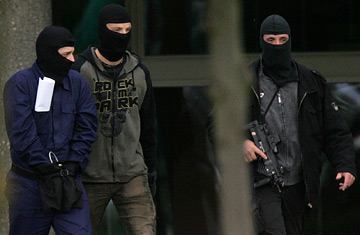
A terror suspect, left, is led away at the German Federal Court in Karlsruhe, southern Germany.
The foiling of two separate terror plots against targets in Europe in the space of just 12 hours suggests that al-Qaeda and its sympathizers are ramping up their terror activities on the continent. German prosecutors announced Wednesday that three men with links to al-Qaeda — two German-born converts to Islam, aged 22 and 28, and a 29-year-old Turkish national — have been arrested in central Germany while plotting "massive bomb attacks" against targets in Germany. The targets are suspected to have included the Ramstein air base used by the U.S. military en route to Iraq and Afghanistan, as well as nightclubs and pubs frequented by Americans and the Frankfurt airport, one of Europe's largest. Germany's attorney general said police had prevented attacks that would have claimed many lives.
Hours earlier, Danish police had rounded up eight people in connection with a plot to target the capital, Copenhagen. German and Danish officials acknowledged similarities between the two cases, but said there was no "direct" link. "The structures of the group is comparable and the materials used are similar," said one official. Germany's Interior Minister, Wolfgang Schaeuble added, "There are parallels: The directions, presumably, came from Pakistan."
In Germany, the "leitmotif of the attackers was a profound hatred of U.S. citizens," Joerg Ziercke, head of Germany's federal criminal police service said. The arrests come at the end of a summer of increased vigilance by European police following warnings that al-Qaeda was "reconstituting" itself around the world. German police also believe the looming 9/11 anniversary may have also have been a "motivation" for the timing of the planned attacks.
Denmark, which has sent troops to both Iraq and Afghanistan, and Germany, whose soldiers have served in Afghanistan, have thus far avoided major terrorist attacks, although police have foiled several attempts. Germany was also a staging area for the 9/11 attacks in the U.S.
The German plotters had been under surveillance for some time — one of the three was questioned last New Year's Eve after being spotted near a U.S. Army barracks outside Frankfurt. He told authorities he was there to watch the fireworks, and was allowed to go free, but was closely monitored, officials revealed. Operating in a rural part of southern Germany, the cell was observed assembling a stock of hydrogen peroxide sufficient to produce the equivalent of 1,200 pounds of TNT, far more than the explosives used in the terrorist attacks on London and Madrid. "I could imagine, for example, a scenario with several car bombs exploding simultaneously in different places," Ziercke said.
Police were so concerned by the plotters' acquisition of the chemicals that, in July, they broke into the storage facility and replaced 12 barrels of concentrated hydrogen peroxide with a diluted substitute that would not have been useful in making a bomb. The trigger for the arrests was a decision by the plotters, after being stopped at a routine roadside police check because of faulty headlights, to move the chemicals to a new site. "They were getting nervous," said a prosecutor.
Wolfgang Bosbach, a German Member of Parliament, noted that Germany is about to begin debating the extension of its troop deployment in Afghanistan. That, together with the 9/11 anniversary, means that "we are in a very sensitive period," he said.
The three accused were trained in Pakistan, prosecutors said, and were members of an al-Qaeda-linked organization known as the Islamic Jihad Union, a group first established in Uzbekistan that has since sprung up elsewhere in the world. Police noted that the cell continued to work even though they must have known they were under surveillance, an indication of their militant zeal to press on despite the risks, said one police official.
The alleged Danish plotters had also been watched for several months before this week's arrest. There, too, large quantities of chemicals used to make explosives had been assembled, although which chemicals was not disclosed. The eight men arrested by Danish police included an Afghan, a Somali and a Pakistani, but six have since been released because of Denmark's judicial requirements prohibit detention without charge for longer than 24 hours. Two men remain in custody.
German officials have used the arrests as an opportunity to call for tougher anti-terrorism laws, as have some of their European counterparts. "This is a good day for security in Germany," Schaeuble said. "We have to remain vigilant."
